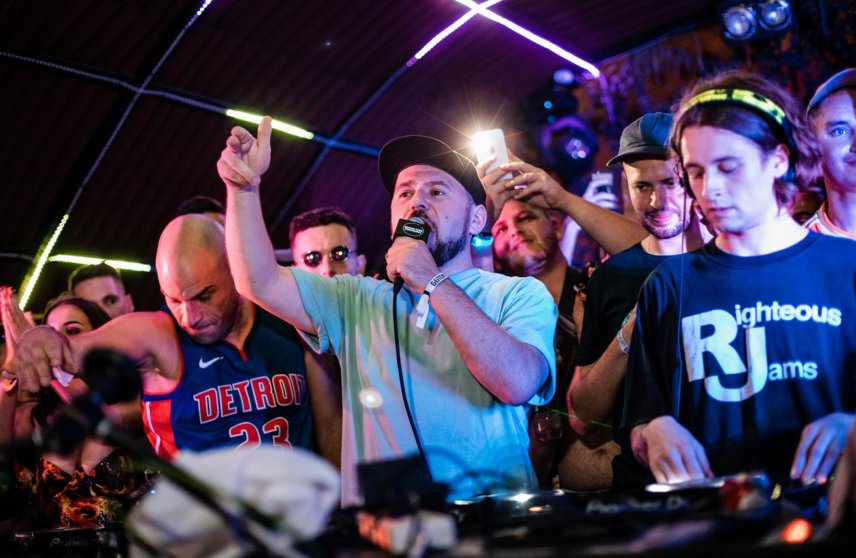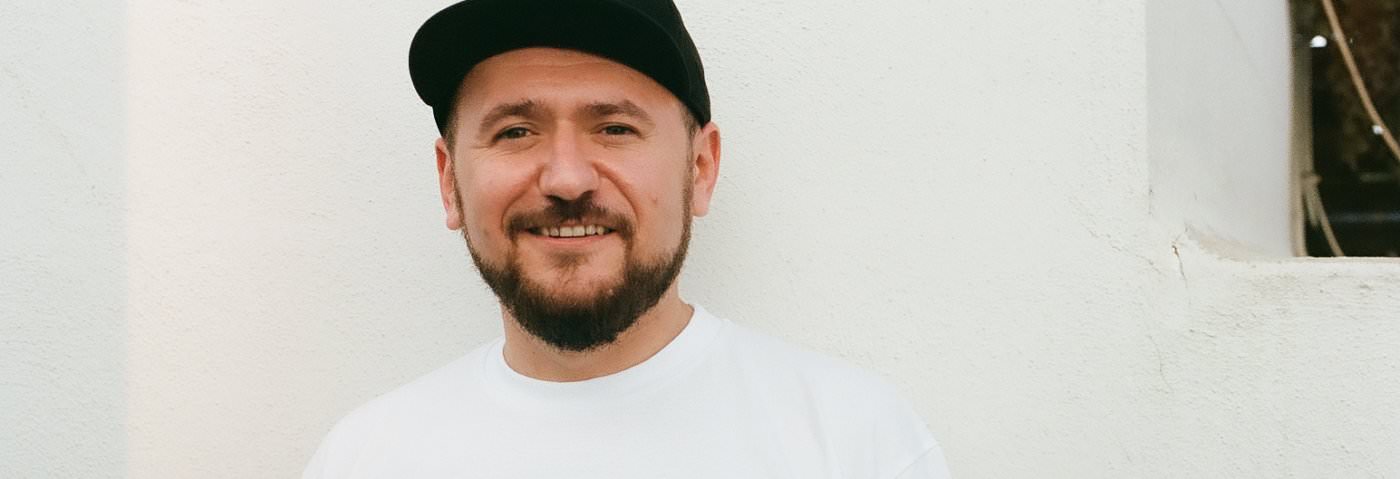
Boiler Room is one of dance music’s most recognisable brands. In this month’s Business Of Music feature, we speak with Boiler Room host and general director of Boiler Room Germany Michail Stangl about Berlin, legendary moments and the power of live streaming.
While some may know Michail Stangl simply as the host of Boiler Room, he insists picking up that mic is only ‘the smallest part of the job’. And that job is one of many he has: as general director of Germany Boiler Room he oversees the production of Berlin shows and international shows that have taken place in the likes of Uganda, Ghana, Cameroon, Mexico, Serbia, Johannesburg, Cape Town, Seoul, New Delhi, Hanoi, Shenzhen and more in the last two years. Besides this, he co-curates Berlin’s CTM Festival – one of the world’s biggest and oldest annual festivals for experimental music, newform club music and the related arts. And besides that, you’ll find Michail running and DJing as Opium Hum at his own night, ≠ (Equal), at Berghain.

Born in Moscow, after moving to Germany in the early 90s, as a 15-year-old he managed to get online thanks to his father, connecting to an online music scene in a way other teenagers in rural areas who had no access to record stores could not. It was at this young age that Michail started hosting events.
“I came from the middle of fuck nowhere where there wasn’t anything much other than cows and Nazi skinheads,” He begins. “I started organising anti-racist, Antifa kind of punk concerts, extending them with electronic elements; I was really into drum & bass so I had to get the only guy with a sizeable drum and bass record collection in the second room. That was just child’s play.”
Berlin a place of transit. A lot of people just cross through the city and leave things behind and you can trace that in the history of electronic music.
After seeing a flyer for a Berlin show featuring all the breakcore, experimental electronic artists Michail listened to at the time, he made an instant decision to move to the city. Soon enough, he began organising parties exploring breakcore and industrial sounds, mixing it with UK dubstep.
Why Berlin?
Why does he think Berlin has such a unique aura about it? “Berlin, due to the history of the city and the socio-economic structure that comes with it,” Michail explains, “always had a lot of space for a lot of things to co-exist and cross-pollinate. It’s not a city that is good at creating its own thing; way more culture starts in London but Berlin is good at enriching existing things with new perspectives.”
“It’s a place of transit. A lot of people just cross through the city and leave things behind and you can trace that in the history of electronic music. There were DJs and collectives in Berlin that would drop dubstep with the Berlin techno community. Collectives would get the DJs from the UK and they would often perform for the very first time in a real club space side by side with Berlin-style eclectic techno. That would change the trajectory to a point that’s it’s now a completely new thing. Things like that happen everywhere but because Berlin has a high density there’s more potential for that.
“The same thing happened with footwork. I used to run a fairly big footwork/juke night. Berlin DJs were playing it knowing the tempo but not the genre, so ‘Okay it’s 160/170’ let’s play it with jungle. Machinedrum, who came from an IDM/jungle sound, would mash it together with Rashad and Spinna in a way Rashad had never thought about their own genre of music before and suddenly footwork took a new trajectory.”
Sounds from all the world funnelling themselves into Berlin, mixing with the local music, people and the context of the Berlin spaces, then being launched out into the world with a new identity is a fascinating image. As a co-curator for CTM Festival, Michail is passionate about not only bringing artists and collectives into Berlin from far and beyond but throwing an element of ‘Berlin’ into the mix, offering a standalone live experience.
For CTM in 2020, Michail reached out to the Nakibembe Xylophone troupe, a Ugandan ensemble – one of the last remaining groups to still play the ensemble embaire xylophone – as well as Indonesian duo Gabber Modus Operandi – producers of gabber, footwork, grindcore, and noise mixed with Indonesian sounds – to perform together.
“Instead of a theatre we did it at peak time Berghain, packed to the fucking brim.” Michail sounds proud of this head-turning combination. “At 1 am, rather than a DJ blasting techno, a ten-man xylophone group from Uganda performed experimental gabber with an Indonesian techno punk outfit. Nothing about that sounds like it should have worked out,” he laughs. “It was one of the most amazing things of the festival.”
While physical events seem a distant memory and don’t look to be on our horizons any time soon, live streams have sky-rocketed in popularity during the pandemic. The power of an online community based around live streaming DJ sets and live performance is an area Michail clearly has knowledge in already due to his involvement in Boiler Room. He oversees the production of shows from Berlin, eastward to Asia and Africa – highlighting countries that usually don’t really get to participate in Eurocentric, Anglo American music markets.
“I’ve been involved with Boiler Room, not since day one, but pretty much day one and a half, since late 2010, early 2011,” Michail says. “We produce out of Berlin office up to 70 shows a year globally a year for Boiler Room, so I’m involved in the aspects of all them in one way or another. I set up Boiler Room China, Boiler Room in Uganda, in Brazil, in Georgia. I have a special focus on a very big part of the world.
“I’m doing way more than just holding a microphone. It’s a proper office job. I see the production of a show from beginning to end with my team which means that I identify something worth highlighting. Let’s say a music community in a country that’s not been featured a lot but we think that our audience will like it and it’s a community that needs exposure to be able to grow – from identifying who we could work with to the point of how to execute the show, it’s for me to work with my team on what the logistics are and what the funding opportunities are in terms of what Boiler Room can invest.”
Every DJ will come out [of Boiler Room] with one hour of HD footage that they could use to build their careers.
Having been online in the 90s when most young people were limited to offline music, the way Boiler Room gives access to everybody to see various cultures around the world can relate to Michail’s personal experience of being part of something online. He lists a set of privileges too, that the platform wanted to open up to all: geographic access, monetary access and economic access. The limits of living in a certain location, dressing a certain way and being able to afford the lifestyle of experiencing the culture of clubs was something Boiler Room aimed to ‘render obsolete’.
“What we were inspired by – which hints at my own personal biography when I was a teenager – was that there were no opportunities to get involved in anything that resembled culture. I didn’t participate but that does not mean that my contribution was more or less because I didn’t have the geographical access to the hubs of it. To democratise that was always something we were passionate about at Boiler Room; to allow all of those kids worldwide that were as passionate about electronic music a way to participate in a fairly abstract but still fairly mediated way.”
Legendary Boiler Room Moments
There have been some legendary moments on Boiler Room. From a UK perspective, Folamour’s ‘Gimme Gimme Gimme’ explosion at FLY festival, Sherelle’s room-shaking footwork/jungle hybrid in Bristol and Bicep’s Ibiza classic at AVA have all been memorable. These moments show that while Boiler Room’s popularity can be used to expose sounds and cities we may never have thought about before, it can also expose new talent, becoming a catalyst for DJ’s careers.
“Every DJ will come out with one hour of HD footage that they could use to build their careers,” Michail says, “and many have done so. Of course, there are many discussions about how legitimate it is that Boiler Room participates in this in the first place but, looking back, our contributions outweigh many of the criticisms because it was a vital role in providing electronic music a worldwide platform. We have gone to great lengths to highlight communities, scenes and artists that would usually not get any airtime in the electronic music media, investing money proactively to go to the other side of the world. Commitment to cultural diversity is something we can pride ourselves with and also contributes to our success more than anything else.”
“Sherelle is a great example of what power the Boiler Room community still can have, making a young DJ from London within months leveraging her from the early stages to being a BBC Radio 1 resident. It’s well deserved because Sherelle and the Six Figure Gang – every single one of them do incredible things, they’re one of the most interesting crews out there in bass music. I’m 100% sure they would have made it up there with their own resources but Boiler Room expedited that by maybe a year or two and got them in a place where they belonged much quicker and that’s something we can be proud of.”
Michail Stangl’s 3 Top Tips for Budding Curators
- Curatorial work is political work. Your biggest responsibility as an event organizer and curator is to educate yourself, not only on the culture or genre you are trying to platform but especially on its historical and current socio-economic context. Culture doesn’t happen in a societal and political vacuum, it’s not just about the music.
- It’s not a business, so don’t get into it if you’re looking to maximise your profit. You have to get into it to maximize your contribution to the creation of an environment where culture can grow and express itself freely.
- Always make sure what the 21-year-olds are into, because if you dismiss the youth, you stop to grow.
Interview by Oliver Payne, a journalist based in the UK. Find him on Twitter and Facebook.
Save 20% on your distribution with iMusician
Attack has partnered with iMusician to offer our readers a 20% discount across all iMusician services.
To redeem the discount use the code below when using iMusician. Learn more.
Supported by

Founded in 2007, iMusician Digital is a digital music distribution provider serving over 100,000 independent musicians and labels. From heavy hitters like Spotify, Apple Music, and Amazon, to genre-specific shops like Beatport and Traxsource, plus popular regional shops around the world, we make it easy for you to get big globally, no matter where you’re from. With our flexible pricing, no annual renewal fees, and real human support by email and phone, we make it easier for you to become more financially sustainable, so that you can make more music. It’s as simple as that…
About this content.
*Attack Magazine is supported by its audience. When you purchase through links on our site, we may earn an affiliate commission. Learn more.

